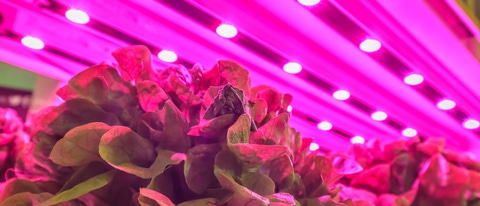BASF joins consortium to improve indoor lettuce cultivation
BASF’s vegetable seeds business is participating in the Precision Indoor Plant Consortiums’ (PIP) Lettuce Project sponsored by the Foundation for Food & Agriculture Research (FFAR). The aim is to develop more sustainable lettuce with longer shelf-life and more appeal to consumers.
Lettuce is a highly perishable crop with high rates of food loss after harvest. Indoor farming systems could produce lettuce closer to the consumer, and, with the right varieties, avoid discoloring after harvest, increase shelf life and simply lead to an optimal product that benefits all players along the value chain.
To this aim, BASF is taking part in PIP, pioneering in a new industry, where novel crop steering technologies under fully controlled growing conditions go hand-in-hand with new breeding technologies. “The participants in this consortium are highly complementary, including experts in crop genetics(BASF), molecular biology(Benson Hill), advanced breeding technology(Greenvenus), plant lighting technology(Fluence), climate control systems, as well as one of the prominent indoor farming specialists(Aerofarms),” explains Peter Visser, R&D Crop Technical Lead for leafy crops. “All companies provide their knowledge, manpower and financial funding to the project which is expected to run over four years.” FFAR matches the companies’ financial contribution with an investment of more than 2,5 million USD.
Only with this combination of different strengths will it be possible to develop better varieties to keep pace with agricultural developments. “A paradigm shift in growing systems is currently taking place, moving part of open-field cultivation to more controlled systems. To stay at the forefront of this development, we need to collaborate with experts from other disciplines who are very much developing these systems,” outlines Gowtham Prakash, Senior Pre-Breeder Leafies. “What we bring to the table is germplasm, our knowledge on plant genetics, the know-how on lettuce breeding itself and the ability to evaluate the breeding output from this project.”
The goals of the cooperation also extend beyond developing lettuce varieties with longer shelf life and better flavor and nutritional value for customers. The focus is also on increasing yields and lowering energy costs in indoor farming to make these innovative cultivation systems profitable for the entire value chain.
And finally, another big asset is sustainability: Indoor farming concepts require less land, save up to 90 percent of water compared to traditional open-field cultivation and reduce the need for chemical crop protection. In addition, they enable cultivation regardless of the geographic location, bringing lettuce production closer to the consumer, avoiding long routes of transport and reducing emissions. The knowledge generated out this project should enable us to develop lettuce varieties with good shelf life and high yield potential under controlled environmental conditions. So, the times where generally over half of harvested lettuce is going to waste should hopefully come to an end soon.

